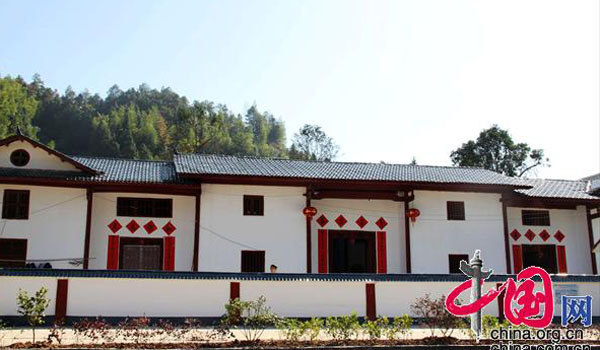Rural reform remains a challenge for China
 0 Comment(s)
0 Comment(s) Print
Print E-mail China.org.cn, June 22, 2013
E-mail China.org.cn, June 22, 2013
Rural development has long perched on top of the agenda of China’s modernization process over the past 100 years. The issue, which remains a hassle until today, has been going up and down numerous times due to the interaction of social powers.
The Chinese elite started to make efforts in changing the impoverished conditions of the country’s rural areas during the late Qing Dynasty (1644-1911). Mi Jiansan and Mi Digang, the father and son from Zhaicheng village, Dingxian County in Hebei Province, were considered the earliest pioneers trying to revive China’s countryside. They mapped out their cause by eradiating illiterates, creating a sense of citizenship among villagers and advocating village autonomy in 1902, nine years before the Xinhai Revolution. Their practice, later studied by Shanxi Province’s warlord Yan Xishan, expanded right in that province and made Shanxi a model for rural reform.
|
|
|
The refurbished rural village in Jiangxi Province. [photo: by Li Jianping / China.org.cn] |
In 1924, a group of Chinese gentries established several publications including the "Chinese Daily" and "Village Autonomy Monthly" in order to spread their theories of village governance among local farmers.
In 1925, the then four-year-old Communist Party of China (CPC) realized the significant power farmers could hold in a revolution. Therefore, they launched a class struggle and land revolution in the countryside and carved out a path completely different from that of the abovementioned intellectuals and gentries.
As of 1925 rural development practices started to flourish all around the country, and they were either led by Confucian theories or Christian religious force.
Famous sinologist John K. Fairbank wrote a whole chapter on rural construction in his "Cambridge History of China -- Republic of China," commenting that the rural revivals via education and economy were in no way to be separated from politics since the movements had to seek government support, which could in turn mandate their legitimacy.
However, under unstable political circumstances, the efforts made in education and economic development to improve the rural conditions, were rather limited. They could not solve the fundamental problems of villages. Prestigious Chinese philosopher Liang Shumin once commented, "When people touted for (independent) social reform, they had to seek for the backup from the government; and when people advocate for village movement, they can change nothing of the villages."
According to Chinese educator and organizer Y.C. James Yen (Yangchu), the fundamental problems of 85 percent of Chinese farmers were illiteracy, poverty, vulnerability and selfishness. Therefore, he said, to revive China, people should first solve the aforementioned four problems.
But his opinion was strongly opposed by Chinese economist Qian Jiaju, to whom the four problems were merely phenomenal. According to Qian, the real problem hid inside the irrational social institutions. Qian’s theory coincided with the theoretical basis of the CPC for rural revolution since the 1920s.
After the adoption of reform and opening up policies, the rural villages were revitalized under the "household responsibility system," carried out in 1982. Nevertheless, the rural movement has eventually been marginalized due to sprawling urbanization.
In 2003, Wen Tiejun, the earliest advocate for China's three rural problems – concerning farmers, agriculture and the countryside – set up the Yen Yangchu Rural Construction College in Zhaicheng village, where Mi and Yen had once worked. This college attracted lots of farmers and drew much media attention. He relayed the rural reconstruction from the forerunners in the past era to the next generation.
In 2004, Wen was appointed head of the School of Agricultural Economics and Rural Development at Renmin University of China, and meanwhile established the Liang Shumin Rural Construction Center in Beijing. In 2005, he set up the Rural Construction Center of Renmin University.
Wen believed industrialization and urbanization have transferred too many costs to the villages already, bringing heavy burdens onto farmers, who therefore face a huge crisis. According to him, if a country, under the impact of dominant industrial capital, international trade and globalized development strategy, relies too much on the imports of food and natural resources, it can hardly avert any globalized crises and, in particular, financial crises.
Compared with his predecessors, Wen has made more progress, but with less resources. Besides, his theories meet with the same difficulties which used to trouble those late intellectuals. However, he has not given up.
Many of his students and followers have started to found their own rural construction programs. His PhD student He Huili, employed by Kaifeng government in Henan Province, is now responsible for the local rural cooperation societies; the Liang Shumin Rural Construction Center continues to persuade university graduates to work in villages; and the famous Little Donkey Farm in rural Beijing is now engaging in organic farming.
Following Wen, many scholars, artists and literati flock to rural China to seek the traditional cultural roots that have been lost in the drastic urbanization.
Yet different from the intellectuals, the villagers, who are in pursuit of personal gain, hold a completely different understanding of rural reconstruction. If the reformers cannot bring real interests to them or hurt one of their groups by assisting another, more vulnerable, one, they would be much antagonized and become hostile.
Despite the difficulties, the intellectuals like Wen Tiejun still adhere to their causes. Wen said he persists in his work because he cannot bear the sight of those impoverished farmers. "The mainstream people have to rethink themselves. Without that process, society would be engulfed by the jungle rules to the extreme."
The author is a publisher and layout designer who is also engaged in rural development research.
The article was translated by Wu Jin. The original unabridged version was published in Chinese by New Weekly.
Opinion articles reflect views of their authors, not necessarily those of China.org.cn.







Go to Forum >>0 Comment(s)